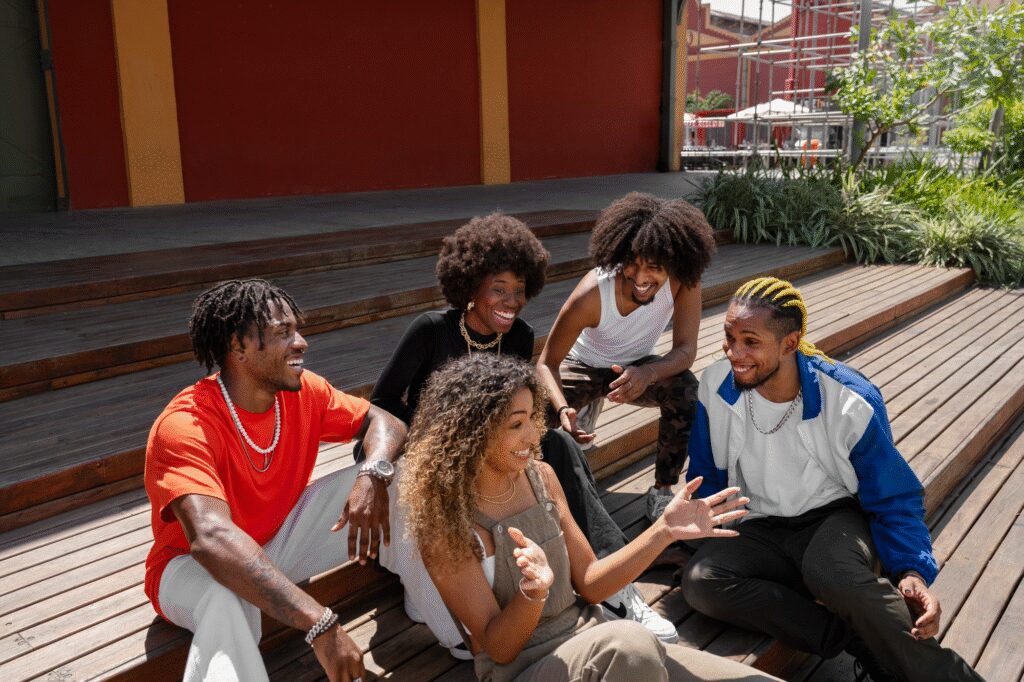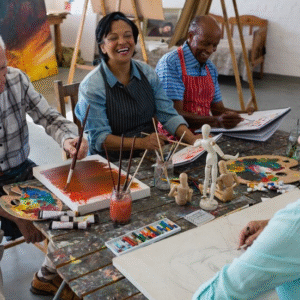Key Highlights:
- The loneliness epidemic is real, with 61% of young adults reporting serious loneliness
- Making friends after college requires intentional effort as natural social structures disappear
- Building adult friendships takes patience and consistency
You graduated, got your degree, and walked across that stage feeling accomplished. Then reality hit: where did everyone go? College provided a built-in social network of dorm neighbors, classmates, and activity partners. Now you’re staring at your phone wondering why making friends as an adult feels impossibly difficult.
You’re not alone in this struggle. A 2021 study confirmed that 61% of young adults feel “serious loneliness,” and Americans report having fewer close friendships than they once did, talking to their friends less often, and relying less on their friends for personal support. The transition from college to adult life creates a unique social challenge that most people don’t prepare for.
The good news, however, is that with intentional effort and the right strategies, you can build a thriving social circle that’s even more meaningful than your college friendships. Here are 15 proven ways to meet people and create lasting connections after graduation.
Why Making Friends After College Feels So Hard
Before diving into solutions, it’s important to understand why adult friendship feels more challenging than college connections. Research shows that no matter what age you are, you feel that in some other time of life it was easier to make friends. But there are specific reasons post-college friendship building feels particularly difficult.
In college, you had natural proximity, shared experiences, and fewer competing priorities. Now you’re dealing with work schedules, different life stages, and the absence of built-in social structures. Adult friendships also require more intentional effort – you can’t just rely on running into the same people in the dining hall every day.
The Foundation: Mindset Shifts for Adult Friendship
Be Patient and Consistent: Making new friends takes time, particularly when working around different schedules and demands. Be consistent, follow up with people, and give it time. Research suggests it takes approximately 200 hours of interaction to develop a close friendship – that’s roughly 6-8 meaningful interactions over several months.
Keep an Open Mind: Be open to trying new things, to new ways of thinking when meeting potential friends. Your college friends might have been people exactly like you, but adult friendships can flourish across different backgrounds, ages, and life experiences.
Focus on Quality Over Quantity: You don’t need to recreate your entire college social circle. A few genuine, supportive friendships will be more fulfilling than a large network of superficial connections.
15 Proven Tips on How to Meet People After College

1. Leverage Your Workplace
Once you’ve graduated you get to go to work instead of going to classes, and that becomes one of your big sources of potential friends. Your workplace is often your best bet for meeting people with similar schedules and possibly shared interests.
How to make it work:
- Join or organize workplace social events
- Suggest grabbing coffee or lunch with colleagues
- Participate in company volunteer days or team-building activities
- Join workplace book clubs, running groups, or hobby clubs
2. Join Professional Organizations and Networking Groups
Professional associations aren’t just for career advancement – they’re goldmines for meeting like-minded people in your field.
Popular options:
- Young Professionals groups in your city
- Industry-specific associations
- Alumni networks from your college
- Professional development workshops and conferences
3. Take Classes or Learn New Skills
Structured learning environments naturally facilitate connections because you have built-in conversation starters and shared goals.
Ideas to try:
- Language classes at community colleges
- Cooking classes at local culinary schools
- Art workshops at community centers
- Fitness classes like yoga, rock climbing, or martial arts
- Dance lessons (salsa, swing, ballroom)
4. Volunteer for Causes You Care About
Volunteeringattracts people with similar values and gives you immediate common ground for conversations.
Effective volunteering opportunities:
- Local food banks or soup kitchens
- Animal shelters and rescue organizations
- Environmental cleanup projects
- Literacy programs or tutoring
- Political campaigns or community organizing
5. Join Recreational Sports Leagues
Adult recreational leagues are specifically designed for people looking to stay active and socialize. Most cities have leagues for every skill level.
Options to explore:
- Kickball, softball, or volleyball leagues
- Tennis or pickleball groups
- Running or cycling clubs
- Bowling leagues
- Ultimate frisbee teams
6. Use Friend-Finding Apps
Technology has made it easier than ever to find people with similar interests. Take advantage of social media and apps like Bumble For Friends to meet new people in your area.
Top friend-finding apps:
- Bumble BFF: Swipe-based friend matching
- Meetup: Find groups based on interests and hobbies
- Facebook Groups: Local community groups and interest-based communities
- Discord: Online communities that often have local meetups
- Nextdoor: Connect with neighbors in your area
7. Attend Religious or Spiritual Communities
Whether you’re religious or spiritual, these communities often have strong social networks and regular gatherings.
Ways to get involved:
- Attend regular services
- Join small groups or Bible studies
- Participate in community service projects
- Attend social events and potlucks
- Join committees or volunteer opportunities
8. Explore Your Neighborhood
Some of the best friendships start with people who live nearby. Being intentional about connecting with neighbors can lead to lasting relationships.
Neighborhood connection strategies:
- Attend community events and festivals
- Join or start a book club in your building or neighborhood
- Participate in community gardens
- Shop at local farmers markets and chat with vendors and other shoppers
- Walk your dog in the same areas and times (or offer to walk neighbors’ dogs)
9. Host Your Own Events
Hosting a potluck dinner party is a great way to bring people together in a low-stress environment. Taking the initiative to create social opportunities can be incredibly effective.
Event ideas:
- Potluck dinners with themes
- Game nights or trivia nights
- Movie nights or watch parties
- Seasonal celebrations (Halloween party, holiday gatherings)
- Skill-sharing workshops (teach something you know)
10. Pursue Hobbies in Group Settings
Individual hobbies can become social when you join communities around them.
Social hobby opportunities:
- Board game cafes or game nights at local stores
- Photography walks or clubs
- Hiking groups
- Book clubs at libraries or bookstores
- Crafting circles or maker spaces
- Wine tasting or beer brewing clubs
11. Take Advantage of Happy Hours and Social Events
Many cities have regular social events designed for young professionals and newcomers.
Events to look for:
- First Friday art walks
- Trivia nights at local bars
- Speed networking events
- Singles events (even if you’re not single – many welcome everyone)
- Cultural events like museum openings or gallery walks
12. Join Alumni Networks
Your college alumni network extends far beyond formal networking events.
Alumni connection opportunities:
- Local alumni chapter meetups
- Alumni happy hours or social events
- Professional mentorship programs
- Alumni volunteer opportunities
- Online alumni groups and social media communities
13. Participate in Community Organizations
Civic engagement is a great way to meet people who care about your community.
Community involvement options:
- Local government committees or boards
- Neighborhood associations
- Community theater groups
- Environmental groups
- Historical societies
- Community emergency response teams
14. Try Co-working Spaces or Coffee Shop Regularity
If you work remotely or freelance, creating routine social interactions can help build connections.
Strategies:
- Work from the same coffee shop regularly
- Join a co-working space
- Attend co-working space events and workshops
- Start conversations with other regulars
- Offer to share a table during busy times
15. Practice “Mini Connections” Everywhere
Making “mini connections” such as speaking, laughing, making eye contact with others helps us all. Everyone can do that with everybody around them. These small interactions can sometimes develop into friendships.
Everyday opportunities:
- Chat with baristas and servers (when appropriate)
- Make conversation in elevators or waiting areas
- Talk to people at the gym between sets
- Strike up conversations while waiting in line
- Compliment someone’s style or ask about their book
Making Connections Stick: From Acquaintance to Friend

Meeting people is only the first step. Here’s how to turn casual encounters into meaningful friendships:
- Follow Up Promptly: If you meet someone you’d like to be friends with, reach out within 48 hours. Suggest a specific activity: “I really enjoyed talking about hiking with you. Would you like to check out that trail we discussed this weekend?”
- Be the Initiator: Don’t wait for others to make plans. Most people are shy about reaching out, so taking the initiative puts you at an advantage.
- Create Regular Touchpoints: Suggest recurring activities like weekly coffee meetups, monthly dinners, or joining the same fitness class.
- Be Genuinely Interested: Ask follow-up questions about things people mentioned in previous conversations. Remember details about their lives and check in about important events.
- Be Vulnerable (Appropriately): Share something personal about yourself. Vulnerability creates deeper connections, but gauge the relationship level appropriately.
Common Mistakes to Avoid
Expecting College-Level Intensity: Adult friendships develop differently than college friendships. They might be less intense day-to-day but can be more meaningful and stable.
Giving Up Too Quickly: It takes time to build adult friendships. Don’t get discouraged if connections don’t form immediately.
Being Too Picky: While you shouldn’t settle for toxic relationships, being too selective about minor differences can limit your options.
Only Focusing on People Exactly Like You: Some of the best adult friendships form between people with different backgrounds, ages, or life experiences.
Neglecting Existing Connections: Don’t forget about casual acquaintances who could become closer friends with more effort.
Creating Your Social Action Plan
Week 1-2: Assess and Research
- Identify your interests and what you’re looking for in friendships
- Research opportunities in your area (apps, groups, classes)
- Set realistic goals (aim to try 2-3 new social activities)
Week 3-4: Start Small
- Join one regular activity (fitness class, volunteer opportunity, etc.)
- Download and set up friend-finding apps
- Attend one social event
Month 2: Expand and Follow Up
- Add a second regular social activity
- Follow up with people you’ve met
- Suggest specific hangout plans with promising connections
Month 3 and Beyond: Consistency and Patience
- Maintain regular social activities
- Continue following up and initiating plans
- Be patient as relationships develop naturally
The Reality Check: Managing Expectations
Building adult friendships is genuinely challenging, and that’s normal. Trying to make friends as adults isn’t that easy. We graduate, we move to bigger cities, and our social network of friends start to get smaller and smaller. Understanding this reality can help you approach friendship-building with realistic expectations.
Some attempts won’t work out, and that’s okay. Not every person you meet will become a close friend, and not every social activity will lead to lasting connections. The key is consistency and patience.
Building Your Support System
Remember that your social circle doesn’t have to look like anyone else’s. Some people thrive with large groups, while others prefer a few close friendships. Focus on building relationships that genuinely enrich your life rather than trying to recreate your college social experience.
Quality indicators of good adult friendships:
- Mutual respect for each other’s time and boundaries
- Support during both good times and challenges
- Shared interests or values (but not necessarily everything)
- Consistent, reliable communication
- Enjoyment of each other’s company without constant entertainment
Your Next Steps
Making friends after college requires intentional effort, but it’s absolutely achievable. The key is putting yourself in situations where you can meet like-minded people consistently and being patient as relationships develop naturally.
Start with activities that genuinely interest you – not only will you be more likely to stick with them, but you’ll also meet people who share your authentic interests. Remember that everyone in these situations is looking to connect, so don’t be afraid to be the first person to suggest grabbing coffee or attending an event together.












